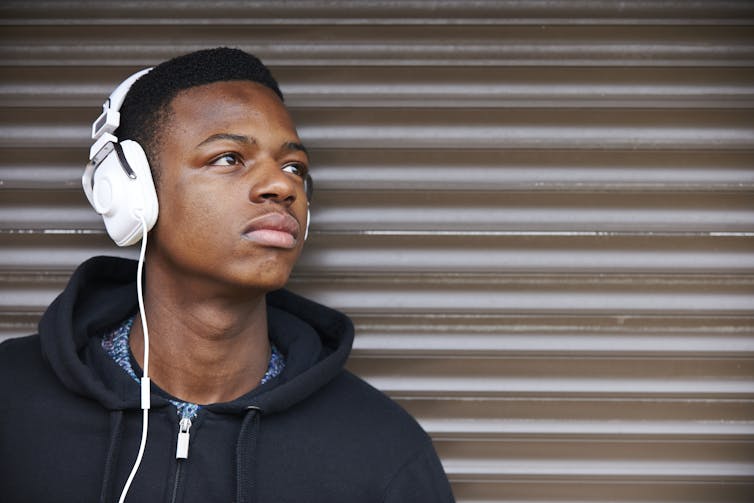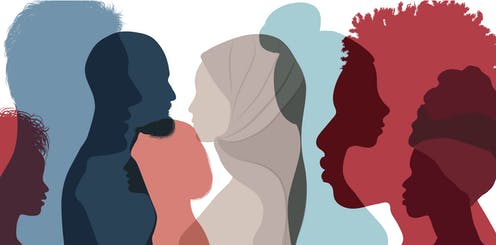melitas/Shutterstock
The horrifying experience of Child Q, a 15-year-old girl who was subjected to a strip search by police officers in her school in Hackney, London, is a harrowing example of how British society associates Blackness with deviant behaviour.
The subsequent child safeguarding review into Child Q’s case has concluded that “racism (whether deliberate or not) was likely to have been an influencing factor in the decision to undertake a strip search.”
The child’s teachers wrongly suspected she had cannabis on her and called the police. The police then strip searched her, without the teachers or the child’s parents present. The ordeal has left Child Q traumatised.
It is likely that racial profiling plays a role in the disproportionately high numbers of young Black people in the justice system. A recent study shows that Black boys and young men are overrepresented at every stage of the youth and adult justice systems in England and Wales. Black children account for only 4% of 10- to 17-year-olds in England and Wales, but make up 34% of the children in custody on remand.
What’s more, a recent personal experience of being racially profiled has also led me to understand quite how harmful profiling and labelling is. This experience spurred my doctoral research into the troubling connection British society at large – and not just its justice system – too often makes between Black people and deviance.
Assumptions of deviance
Sometime in 2021, I went into a supermarket in south London to purchase cough sweets. They cost around 70p. As I was leaving the store, I was asked by the shop attendant – in front of the other customers – whether I had paid for my items. They asked me to provide a receipt, as proof.
I was horrified and embarrassed. I was the only person at the self-checkouts that was asked to produce evidence of my purchase. I felt that there was no plausible reason other than my race that would explain why I was suspected of deviant behaviour.
In sociology, the concept of deviance is best described as a lack of compliance with social norms. Most citizens, at some stage in their life, will be deviant.
The term does not necessarily relate to criminal behaviour. For example, in British culture jumping a queue can be viewed as deviant, and will mostly likely offend or upset someone. However, it is not a criminal offence, and as such there will be no legal implications.
With that said, deviance is often connected to criminal behaviour. Research shows that this misconception causes people to assume that certain groups are more likely to engage in criminal behaviours than others.
For example, media representations of young people wearing attire such as hoodies and caps suggested that those particular items of clothing were associated with crime and violence. This in turn influences public perceptions.

SpeedKingz/Shutterstock
In my previous role as a probation officer working in an inner London borough, I often had young Black men tell me that they felt that society automatically associated them with crime and deviance, even before they had committed a crime. This, they said, impacted their identity and how they viewed themselves.
These young men’s experiences are widely supported by research. There are double standards in how deviance and criminality is viewed dependent on a person’s ethnic background.
Studies also show that this in turn causes disparities in our understanding of what behaviour is deviant. It shapes our assumptions about some groups being more deviant than others.
While I had taken on board these young men’s testimonies, I had not fully understood the true impact this can have on a person’s sense of identity, and how harmful this profiling or labelling can be, until it happened to me.
The impact of identity
I recognised that being a well-educated, professional Black woman – what identity experts would define as my positionality – had somewhat blinded me to the reality of everyday experiences for young Black men.
Positionality is the social and political context out of which a person’s identity is created. It relates to their race, class, gender, sexuality and level of ability, and can both influence and bias their understanding of the world. If people have not had certain experiences as a result of their positionality, they can fail to truly understand them.
It is the reason some people who have never experienced racial profiling, for example, can misconstrue other people’s comments or criticisms about racial inequality and discrimination as having “a chip on their shoulder”.
We all have to recognise the harm this causes, and not wait until we or someone close to us experiences it, before we act on it. We should investigate and question discrimination from the perception of those who experience it.
This principle was articulated by the 1999 Macpherson Report into institutional racism in the UK, which was prompted by the racially motivated murder of Stephen Lawrence, a young Black man, in 1993. Unfortunately, the findings from the report still ring true nearly 30 years after it was written.
My own profiling experience left me questioning how I am viewed in wider society. For me, the experience reinforced what research has shown about how Black people, from all backgrounds, too often have feelings of both invisibility and hyper-visibility.
Invisibility in areas that matter: good job prospects, positive representations in popular culture, political debate. And hyper-visibility in the criminal justice system, negative portrayals in popular culture and general disenfranchisement in society.
What’s more, in connecting Black people and subcultures with deviance, British institutions such as the criminal justice system, schools and even health services criminalise Black people. Social institutions are crucial in shaping societal views, precisely the kind that foster phenomena such as racial profiling.
![]()
Nicole Nyamwiza ne travaille pas, ne conseille pas, ne possède pas de parts, ne reçoit pas de fonds d'une organisation qui pourrait tirer profit de cet article, et n'a déclaré aucune autre affiliation que son organisme de recherche.











